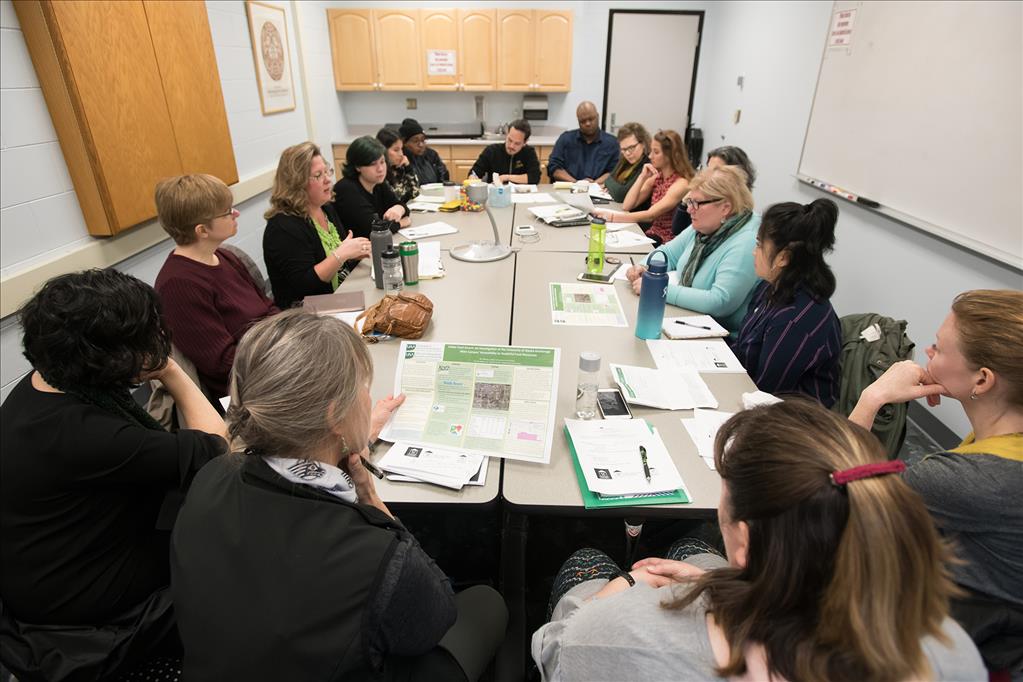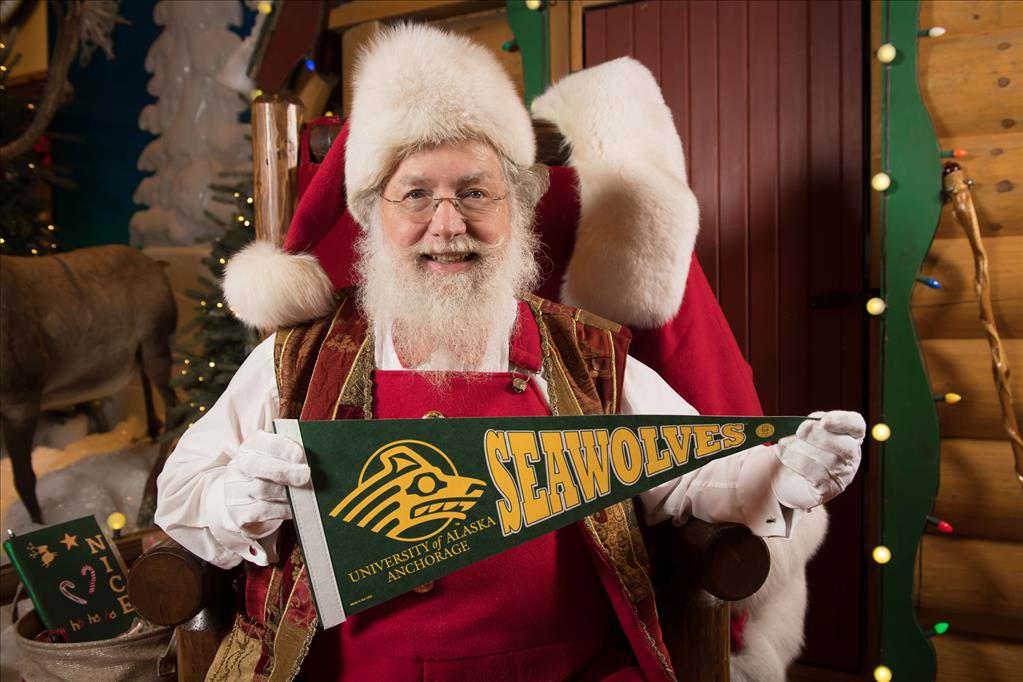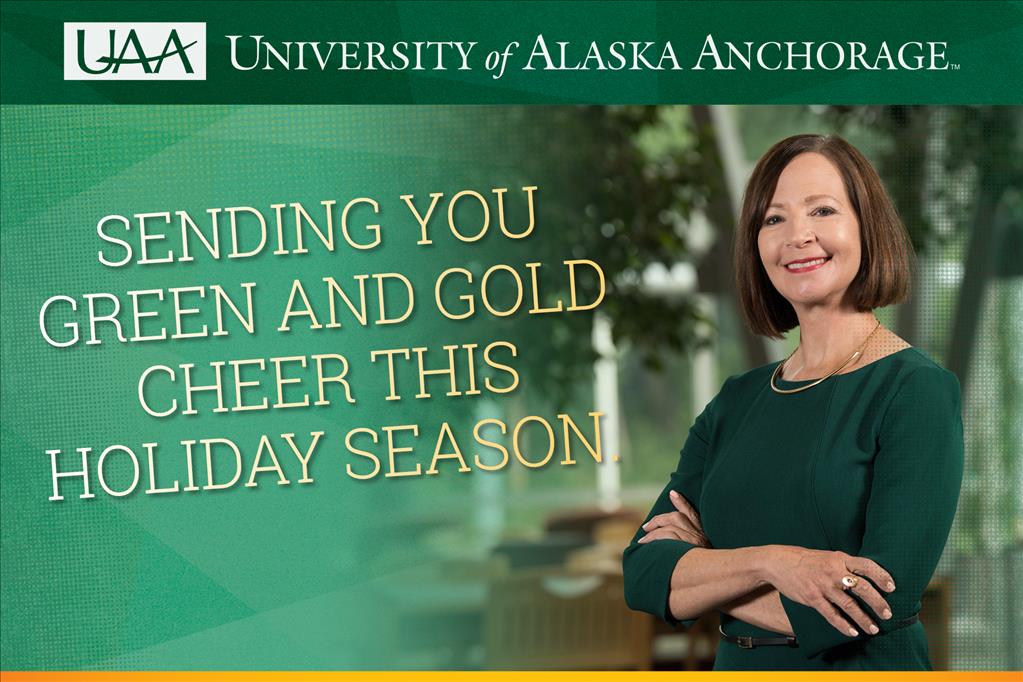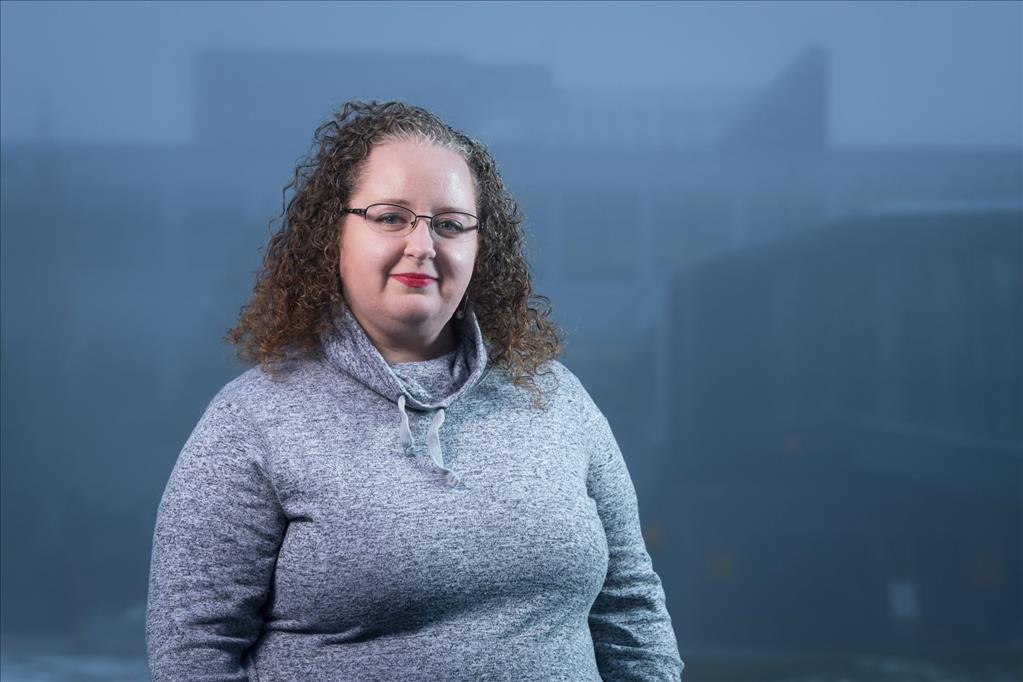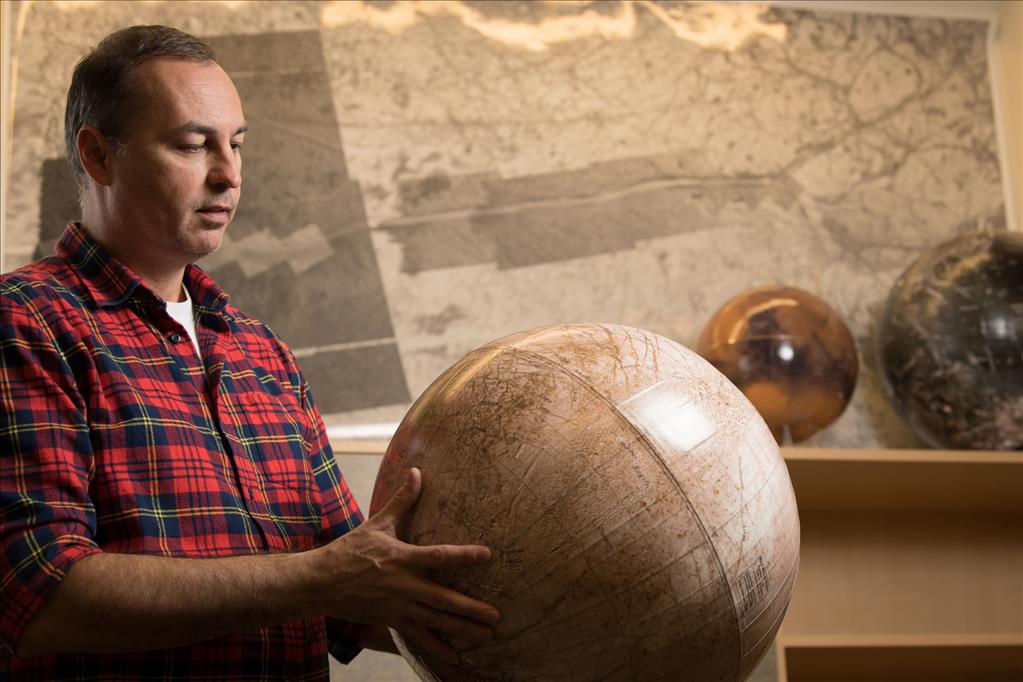Olympic cross-country skier plans to grow engineering career at UAA
by Jess |
Reese Hanneman, a renowned Nordic skier, did his home state proud when he competed on the U.S. Olympic team earlier this year, taking 14th place Feb. 18 in the men's 4x10 km relay (with a time of 21:15) at the Olympic Winter Games in Pyeongchang, South Korea.
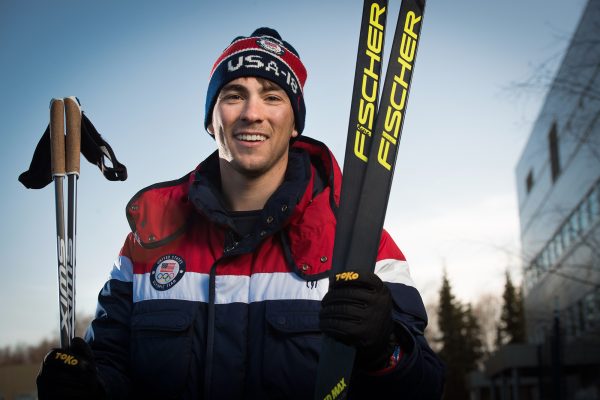
Renowned Nordic skier Reese Hanneman, who represented the U.S. at the 2018 Olympic Winter Games, photographed in front of UAA's Engineering and Industry Building. Hanneman will return to UAA's College of Engineering in the fall to finish his degree in mechanical engineering. (Photo by James Evans / University of Alaska Anchorage)
While Hanneman has long skied for Alaska Pacific University - spending summer weeks either on roller skis, training on Eagle Glacier, competing in triathlons, or riding mountain and road bikes - he is a UAA student as well, with a formidable goal: earning a degree in mechanical engineering.
"I think I was lucky enough to have some good math and science teachers as a kid," Hanneman said. "My dad is an engineer, and my uncle, here in Alaska. I was blessed with people who supported me in that type of learning. I enjoy that type of thinking."
Raised in Fairbanks, living in Anchorage
Hanneman grew up in Fairbanks, the son of parents who reveled in skiing and races.
"My parents taught me how to walk on skis," he said. "My parents weren't hard core but they got me out on skis. When spending winters in Alaska, you've got to find something to do outside. It's a good way to keep a little kid active."
Hanneman began taking cross-country ski racing seriously while in high school.
"I had done a lot of sports, but cross-country skiing ... just early on I felt there was that return on investment. I put in some time, was motivated. I wasn't training hard by my standards now - at 15, I thought I was training hard."
Skiing was Hanneman's social life as well as his athletic passion.
"I enjoyed skiing; it was something to do with my friends," he said. "We had a great group in Fairbanks, my buddies. Obviously you're motivated when you have success, a good race. There was a community that supported me, an outdoorsy and ski-oriented community both in Fairbanks and Anchorage. Alaska is an awesome place to be a skier, with good places to train and usually good snow."
Plotting a future
In the classroom, Hanneman quickly knew engineering would likely be his career path, even as far back as high school.
"I knew I loved building and designing things, calculating things," he said. "For me, it was a natural fit to go into an engineering program here in Alaska. It's something I've always loved. I did it for a while along with my skiing career, but when my skiing career got really serious, I had to cut back on the schooling a little bit. It's a passion of mine, a good balance of the creative and the analytical."
Engineering seemed a natural fit for someone accustomed to using devices calibrated to help an athlete extract the very best from their training and skills.
"Being a skier and an athlete basically my whole life, I've always looked at sporting equipment - skis and bicycles - with an engineering [viewpoint]," he said. "I was known in elementary school for drawing up design plans for suspension kinematics for bicycles. I was fascinated with mountain bikes, road bikes, would do my mental design. Skis are both simple and complex from an engineering standpoint. I haven't spent a lot of time doing engineering on my skis, though, because the guys who built the skis have done all that."
Hanneman attended UAF for two years before moving down to Anchorage to ski full time.
"When I moved down here, it was a really natural transition to UAA, into their engineering department," he said. "I really liked UAA, have had some really great professors here at UAA. My advisor, Matthew Cullin, has been really awesome. It's a really welcome program to be a part of."
The Olympic dream
For as long as he can remember, Hanneman has wanted to vie in the Olympics.
"I remember being a kid and meeting Olympians or elite skiers and athletes and how motivating it was," he said. "As an elite athlete, I think that's part of our role in the community, to be ambassadors for the next generation for healthy lifestyles, encouraging kids not to be afraid of working hard, being passionate. That's how we as athletes can return the support we're given. They're so receptive and love hearing anything about what we do."
Hearing he had made the Olympic team felt indescribable, he said.
"Representing the U.S. at the Olympic Games has been a goal of mine for close to 20 years of my life," he said. "It's one of those 'reach goals' that are so far off that you often really don't think you'll ever be able to do it, so when I heard officially I had made the team, it was just an amazing feeling of accomplishment, thinking of all the hard work and sacrificing time of all the other people involved. I did the training but there have been so many people like my parents, coaches, sponsors that I would never have been able to make the team without them. It was really powerful to realize I had gone from being that little kid looking up at an Olympian, thinking it was an impossible task, to actually being there myself."
The time he spent at the Games was "awesome," he said.
"It was a very intense three weeks being in Korea," he said. "I was very impressed with the country, the people there, the food. The locals were so nice. It made me want to go back and explore it outside of the Olympic bubble."
"It was really busy, very hectic, just nonstop transportation and security and logistics and media demands," he continued. "Of course you're training every day, testing skis and competing. It was really cool but exhausting, honestly. The accommodations are amazing. They build a city to house the Olympics. On that front, it's awesome - you have everything at your disposal. You're committed, you're there trying to focus on competing the very best you can. You are trying to balance enjoying the experience, while trying to maximize your performance, which is really your job there as an athlete."
Hanneman said the weeks flew by.
"The last 15 years of my life have been more or less dictated by my training schedule and competition schedule," he said. "There really is no time off when you looking at trying to compete at the Olympic level. After the Olympics, it's amazing to feel the weight of that lifted off my shoulders. I had done it. All that work, sacrifice, effort and time ... I was able to bring that Olympic dream to fruition. It was a bit of a relief."
Moving forward
His engineering studies moved into the background as Hanneman ramped up training for his Olympic and other world-level competition efforts, but he plans to resume his academic schedule in the not-so-distant future.
"Skiing has really been my main focus," he said. "The hard part is I'm gone all winter, and summer is really the intense training season. I had to make a decision what to focus on. I haven't been able to do internships, but am really excited to have the chance."
What is Hanneman's career goal?
"People have asked me that forever, I'm not totally sure," he said. "I love being in Alaska, which limits it a little bit. I've always dreamed how cool it would be to be an engineer for a Formula 1 team or motorcycle company. I'm looking for positions that combine the creative and mathematical elements of engineering. I think that will be my strength when I go into the field full time, being able to balance engineering and design and communication."
Written by Tracy Kalytiak for UAA
 "Olympic cross-country skier plans to grow engineering career at UAA" is licensed under a Creative Commons Attribution-NonCommercial 4.0 International License.
"Olympic cross-country skier plans to grow engineering career at UAA" is licensed under a Creative Commons Attribution-NonCommercial 4.0 International License.










